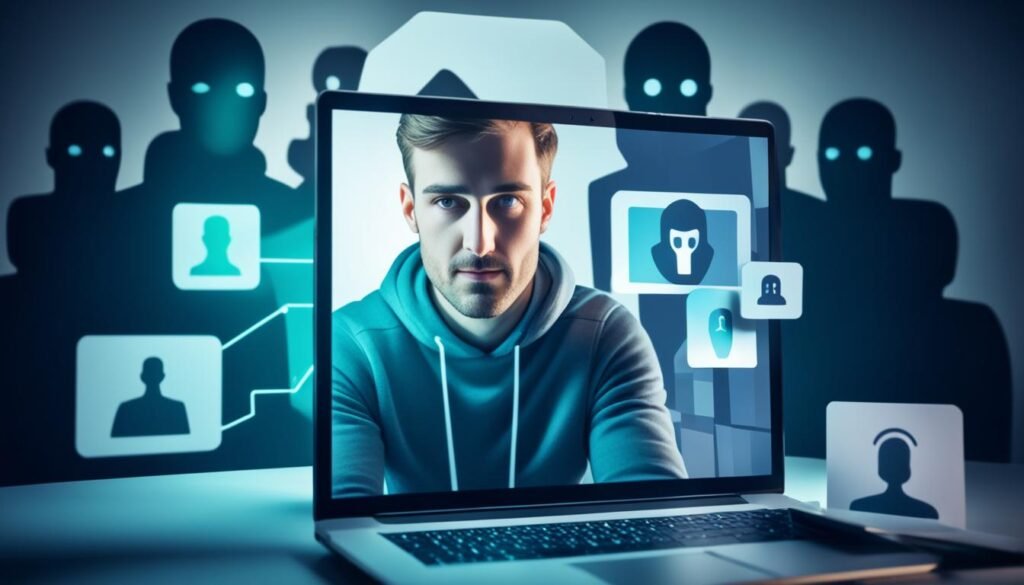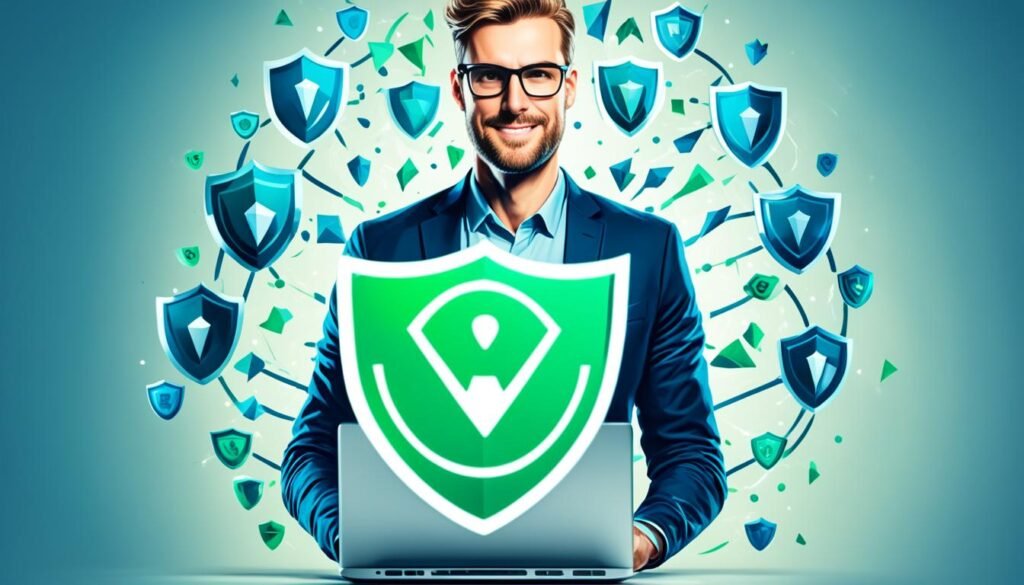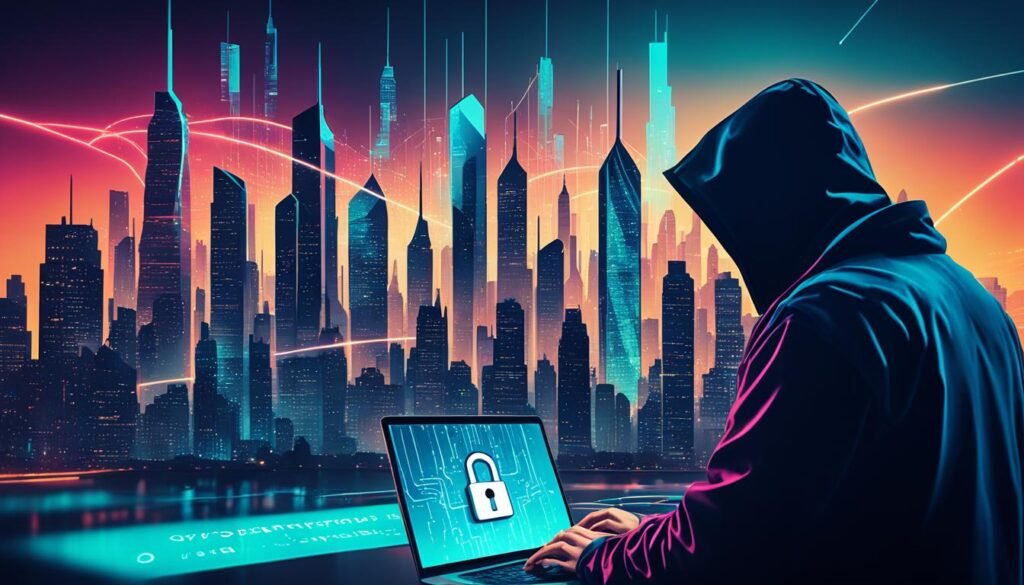Ever wondered how to surf the web without anyone tracking you? A virtual private network (VPN) could be the solution. VPNs hide your IP address and make your internet connection secure. This keeps your data safe from hackers.
In today’s world, keeping your online data safe is key. But what makes a VPN online keep your information private? It’s important to know how VPNs work to protect your online life.
VPNs use SSL/TLS protocols to secure your data, like OpenVPN and SoftEther VPN. Microsoft’s Secure Socket Tunneling Protocol (SSTP) also offers flexibility. Then there’s WireGuard, which uses top-notch encryption for better online privacy.
If you care about your online privacy, a good VPN is a must. It helps you access blocked content and keeps your data safe. A reliable VPN is essential for anyone who values their online security.
What is a Virtual Private Network (VPN)?
Understanding what a virtual private network is key for keeping your online life safe and private. A VPN means “virtual private network” and is a strong tool to protect your online activities.
Definition and Basic Concept
A virtual private network makes a secure tunnel for your data to travel through the internet. This safe path keeps your information safe from hackers and others. Using a VPN hides your IP address and online actions, keeping your data safe from ISPs and hackers.
How VPNs Enhance Online Privacy
Using a virtual private network is a smart way to boost your online privacy. VPNs protect your internet use from anywhere, keeping your data safe on public Wi-Fi. Even if a VPN might slow down your internet sometimes, it greatly increases your security and anonymous browsing.
There are many VPN services out there. Choosing a trusted one makes sure your data stays safe and private. This is thanks to strong encryption and strict privacy rules.
How Does a VPN Work?
Understanding how a VPN works is key to seeing its benefits for online privacy and security. A VPN changes a device’s internet path through its own private server, not the user’s ISP. This leads to several important features that protect data and keep users anonymous.
Encryption and IP Masking
Encryption is a vital part of VPN functionality. It turns data into unreadable code using complex algorithms like RSA and AES. This keeps the data safe from anyone who might try to intercept it. IP masking is also crucial. It hides the user’s IP address, making it hard for cyber attackers or websites to track the user’s online actions.
The Protective Tunnel Effect
The VPN creates a “tunnel effect” for protection. It sends internet traffic through secure VPN servers, shielding the user’s data from threats. Even if data is intercepted, it looks like nonsense to the interceptor. This is vital for users on public Wi-Fi, where cyber threats are more common. Using a VPN offers a strong defense against cyber attacks, protecting sensitive info and ensuring privacy online.
Benefits of Using a Virtual Private Network
Using a Virtual Private Network (VPN) has many advantages for both individuals and businesses. It boosts online security and lets you access content blocked in your area. These benefits are key in today’s digital world.
Improved Online Security
VPN usage greatly improves online security. They use 256-bit encryption for secure data transmission. This makes it hard for hackers to get your personal info.
VPNs also stop ISPs from slowing down your internet. This lets you enjoy your online activities without any problems.
Access Restricted Content
VPNs are key for getting past geo-blocks. They give you a new IP address, so you can see content from other areas. This is great for those who want to watch shows or access websites not available in their area.
They also help remote workers get to important resources safely. This boosts work productivity.
Enhanced Anonymity
VPNs make you more anonymous online. They hide your IP address and send your internet traffic through a secure tunnel. This keeps your online activities private.
This privacy is crucial for keeping your identity safe while browsing the web. It stops trackers from following you online.
In summary, VPNs offer more than just secure access. They provide full online protection, let you access more content, and keep your identity hidden.
Choosing the Right VPN Service
When you start looking for a VPN service, it’s important to think about several things. You want to make sure you choose a service that keeps your online activities safe and private. Picking credible VPN providers is key to protecting your data from threats.
Look for a VPN that has been security audited. VPNs like NordVPN and Mullvad VPN have been checked by outside experts. This means they are safe. Also, check their logging policies to see how they handle your data. A VPN that says it doesn’t log anything is usually trustworthy.
The server network of a VPN is also important. VPNs like ExpressVPN have servers in over 90 countries. This means you can get around geo-blocks and have a stable connection. They also have special servers like Tor over VPN for extra privacy.
Speed matters when choosing a VPN service. Good VPNs usually lose about 25% of your speed at most. NordVPN is fast, losing only 11% of speed, making it great for those who need quick internet. Surfshark, Proton VPN, and ExpressVPN also offer fast speeds for a smooth online experience.
It’s important to consider how many devices you can connect to a VPN. Some VPNs, like Surfshark and PIA, let you connect unlimited devices. ExpressVPN allows up to 8 devices at once. This is good for families or people who use many devices.
Don’t forget to think about the cost of the VPN service. Some top VPNs, like ExpressVPN, cost about $100 a year. But, Surfshark and PIA are cheaper, costing between $40 to $60 a year. Stay away from free VPNs because they can be risky, except for Proton VPN.
Finally, stay updated on any new risks. Recent studies show that iOS users with certain versions might face VPN leaks. This means you need to be extra careful when using a secure VPN.
Top VPN Providers to Consider
Choosing the right VPN service can be tough with so many options. Our team tested 19 products last year to help you find the best. We’ll focus on three top providers: Mullvad VPN, Proton VPN, and Surfshark VPN.
Mullvad VPN
Mullvad VPN is known for its strong privacy focus. It accepts anonymous cash payments and has open-source apps for more transparency. This means your data stays safe and secure, making it a top pick for privacy lovers.
Proton VPN
Proton VPN is often seen as one of the best VPNs around, earning a 5-star rating. It’s known for its strict privacy rules and fast, secure connections. Plus, it has a free plan for those who want protection without paying right away.
Surfshark VPN
Surfshark VPN is often mentioned as a top VPN choice. It’s great for its many connections and works in 100 countries. With fast speeds and strong security, it’s perfect for streaming and safe web browsing. It’s rated as the Best VPN for Security with a score of 9.5/10.
VPN and Online Privacy

In today’s digital world, keeping your online privacy safe is key. Every day, over 2,200 cyberattacks happen, making it crucial to have strong security. Virtual Private Networks (VPNs) are vital for online safety. They help prevent data collection and keep your browsing private.
Preventing Data Collection
VPNs encrypt all your internet traffic, making it safe. This encryption stops others from collecting your data, which is a big reason for most digital breaches. By hiding your IP address, VPNs stop tracking and keep your personal info like passwords and credit card numbers safe.
Top VPNs also have a strict no-logs policy. This means they don’t store any of your data while you’re online.
Online Anonymity and Safety
VPNs also help you stay anonymous online. With strong encryption and automatic kill switches, you can surf the web without worrying about being watched. But, pick a VPN you trust, as some might share your data with others, risking your privacy.
VPNs make your browsing private by hiding your IP address and avoiding tracking. They might slow down your internet a bit, but the extra security is worth it.
Addressing VPN Security Concerns
More people rely on VPNs for work and personal use. It’s key to tackle VPN security concerns well. Picking a VPN that’s trusted and has a good history helps lower risks. Also, knowing how to use it right lets users enjoy VPNs safely.
Importance of Choosing Credible Providers
It’s crucial to pick a VPN that’s reliable and trustworthy. Good VPNs get checked by others, showing they care about privacy and security. Providers like Mullvad VPN, Proton VPN, and Surfshark VPN don’t keep logs, keeping your data safe.
Looking at where the VPN is based also matters. Some VPNs are in countries with strong privacy laws. This adds more protection against unwanted data access.
Best Practices for Safe Usage
Following VPN safe practices keeps your online life secure. Here are some tips:
- Enable strong authentication: Choose VPNs with extra login security.
- Use advanced encryption algorithms: Make sure your VPN uses strong encryption to keep your data safe.
- Implement additional security features: Pick VPNs with anti-virus, intrusion detection, and prevention tools.
- Activate the VPN kill switch: This stops your real IP from being seen if the VPN connection fails.
- Stay informed about Perfect Forward Secrecy (PFS): PFS keeps past sessions safe, even if long-term keys are at risk.
Using a Zero Trust architecture, like what Palo Alto and Cisco do, also helps. It limits access to only what’s needed.
With these VPN safe practices, you can protect yourself online. This makes your internet use secure and private.
VPN Usage for Remote Work
The need for secure and efficient remote work solutions is clear today. Virtual Private Networks (VPNs) are key in keeping employees safe while working from anywhere. They make sure data stays safe and private, even on public Wi-Fi.
With more cyber threats out there, companies must use strong VPNs. This keeps their data safe from hackers.
Secure Remote Access
VPNs like WireGuard are great for protecting data in remote work. They let workers connect safely to company resources. It’s important to choose VPNs with strong encryption and good support.
Many companies use VPNs to control access to their digital assets. This keeps their data safe from unauthorized access.
Connecting to Office Networks
VPNs need to support many connections without slowing things down. This helps avoid losing productivity. It’s also key for remote workers to follow good cybersecurity habits.
This includes keeping credentials safe and watching out for phishing scams, even with a VPN. Companies should think about the best VPN type for their needs.
Using VPNs for remote work is becoming more common. It helps with secure file sharing and virtual meetings. By using VPNs, companies boost cybersecurity and keep networks fast and reliable. This makes sure employees can work remotely without issues.


